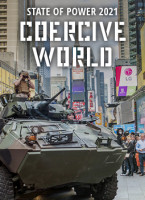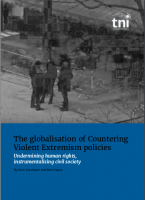Abolish national security
Topics
In this publication Arun Kundnani argues that a politics of abolitionism offers the best approach to overcoming the failures of US national security policy. More than calls to abolish individual national security agencies, abolitionism offers a conceptual framework within which the concept of security can be rethought and actions taken towards a deep transformation of policy-making.

Downloads
Authors
Download the full publication here.
While the Covid-19 pandemic raged in 2020, at least fifteen million people participated in Black Lives Matter actions across the US. This movement represented a coming to terms with the US’s history of racist violence. The generation derided as “woke” has begun to understand that war, prisons, and borders do not advance the well-being of the majority of people in the US, that turning the US into an “armed lifeboat” is no solution to climate crisis and zoonotic pandemics, and that there is no trickle down of wealth under racial capitalism, even for most white people. Those who have come of age in the aftermath of the financial crisis of 2008/9 are moving on from the false image of an exceptionally virtuous US.
As with any movement, within it there are various motivations and orientations. Of particular note is the abolitionist approach that has shaped much recent Black-led mass struggle, influenced by Black feminist politics and queer organizing – and the radical notions of care that these traditions embody. Abolitionism is a mode of political thinking and practice that has emerged from twenty years of organizing against the prison-industrial complex by groups such as Critical Resistance. Abolishing prisons and defunding the police are its most prominent aims but opposition to border violence and militarism has also been important. Abolitionism locates policing and incarceration within a broader set of structures that includes borders and military violence deployed abroad. Fifteen years ago, one of the leading thinkers on abolitionism, Angela Davis, called for anti-prisons organizing work to expand to take on the global imprisonment networks of the War on Terror. Today, groups such as Dissenters are organizing against the entirety of the US’s national security infrastructure from a Black abolitionist perspective.
"At the core of abolitionist politics is an attempt to reconceptualize the notion of security."
At the core of abolitionist politics is an attempt to reconceptualize the notion of security. The logic that dominates the criminal-legal system, argue abolitionists, involves thinking of harm as a problem that can be solved through officially sanctioned punitive violence. This has two consequences. First, it means that the criminal-legal system intensifies rather than reduces the circulation of violence, giving rise, in turn, to demands for more police and more prisons – a perpetual motion of criminalization. Second, it means that attention is diverted from examining the underlying social and economic causes of what we call “crime.” Prisons instead serve to screen off the social problems that result from the “unmanageable political economy” of global capitalism. But in doing so, those problems are worsened. The massive expansion in the number of prisons and the militarization of law enforcement are not responses to increased crime but an integral part of neoliberalism, which involves declaring large numbers of people as “surplus.” Prisons are ways of hiding such people from view and forgetting about the social questions they invoke; racism is essential to this process.
In such circumstances, abolitionists argue, calls to reform prisons and police forces to make them more humane can do more harm than good. So, too, do calls to differentiate more effectively between those who deserve to be incarcerated and those who do not. Such calls avoid a reflection on the root causes of the problems that prisons and police pretend to solve. Instead, abolitionism proposes the creation of an “array of social institutions that would begin to solve the social problems that set people on the track to prison, thereby helping to render the prison obsolete.” This broader sense of security would involve meeting educational, childcare, housing, and healthcare needs as well as decriminalizing drug use, sex work, and migration. By also creating a justice system based on reparation and reconciliation rather than retribution and vengeance, there would ultimately be no need for prisons.
Of course, achieving that goal is not an immediate possibility. For now, the question is how to push for reforms to the criminal-legal system that move in the direction of defunding and disbanding. The answer will depend upon local context and the balance of political forces. As well as building power through grassroots organizing, electoral initiatives will also play a role. The Movement for Black Lives coalition’s Electoral Justice Project, for example, has proposed the Breathe Act, legislation that would defund federal incarceration and law enforcement, abolish the Immigration and Customs Enforcement (ICE) and Drug Enforcement Administration (DEA), fund community-led, non-punitive approaches to public safety, retroactively decriminalize drug use, invest in education, healthcare, housing, and environmental justice, and extend workers’ rights. The work of imagining alternatives to the criminal-legal system is ongoing.
What is striking, however, is the generative possibilities of applying an abolitionist approach not only domestically within the US but also to its agencies of global security. In this, abolitionism draws upon the legacies of a Black internationalist politics in the US. For the Student Non-Violent Coordinating Committee (SNCC) in the late 1960s, for example, the Black freedom struggle in the US was one element in an international movement for liberation, from Vietnam to Puerto Rico and Palestine. As SNCC chair H. Rap Brown put it: “There is no difference between Harlem and Puerto Rico, or Harlem and Vietnam.” In other words, there is an overlap between the structures of police violence at home and the structures of military violence abroad. Like its criminal-legal system, the US’s military actions abroad spread rather than reduce violence, in ways that are often organized through racism. And they distract us from addressing the social and ecological problems the planet faces. Abolitionism implies that framing discussion on US military actions in terms of which kinds of “intervention” are legitimate and which are not is a limiting horizon that hides from view the structural drivers of endless war. Likewise, discussing who should be constrained by borders and who should not means avoiding reflection on the role that borders play in our social and economic systems and what the alternatives might be.
"An abolitionist framework entails understanding that genuine security does not result from the elimination of threats but from the presence of collective well- being."
An abolitionist framework entails understanding that genuine security does not result from the elimination of threats but from the presence of collective well-being. It advocates building institutions that foster the social and ecological relationships needed to live dignified lives, rather than reactively identifying groups of people who are seen as threatening. It holds that true security rests not on dominance but on solidarity, at both the personal and the international levels. Only from an internationalist perspective can security problems like climate change and pandemic diseases be addressed. In the long term, it is illusory to achieve security for one group of people at another’s expense. In policy terms, an abolitionist approach would imply a progressive defunding and shrinking of the US’s bloated military, intelligence, and border infrastructure, and the construction of alternative institutions that can provide collective security in the face of environmental and social dangers.
In the following pages, it is argued that a politics of abolitionism offers the best approach to overcoming the failures of US national security policy. More than calls to abolish individual national security agencies, abolitionism offers a conceptual framework within which the concept of security can be rethought and actions taken towards a deep transformation of policy-making. This study begins by analyzing the dominant racial security logic that has shaped US policy and some of the defensive reflexes that have blocked efforts to bring about change. It then applies an abolitionist analysis to the Biden administration’s emerging national security policies. While national security is currently organized in response to a range of threats – such as Russia, cyber-attacks, “failed states,” and nuclear proliferation – this study focuses in particular on China and the far Right as new threat narratives. The limitations of the US’s securitized approach to climate and pandemic crises are then discussed. Finally, some suggestions are made as to how an alternative security politics might emerge in the US.



